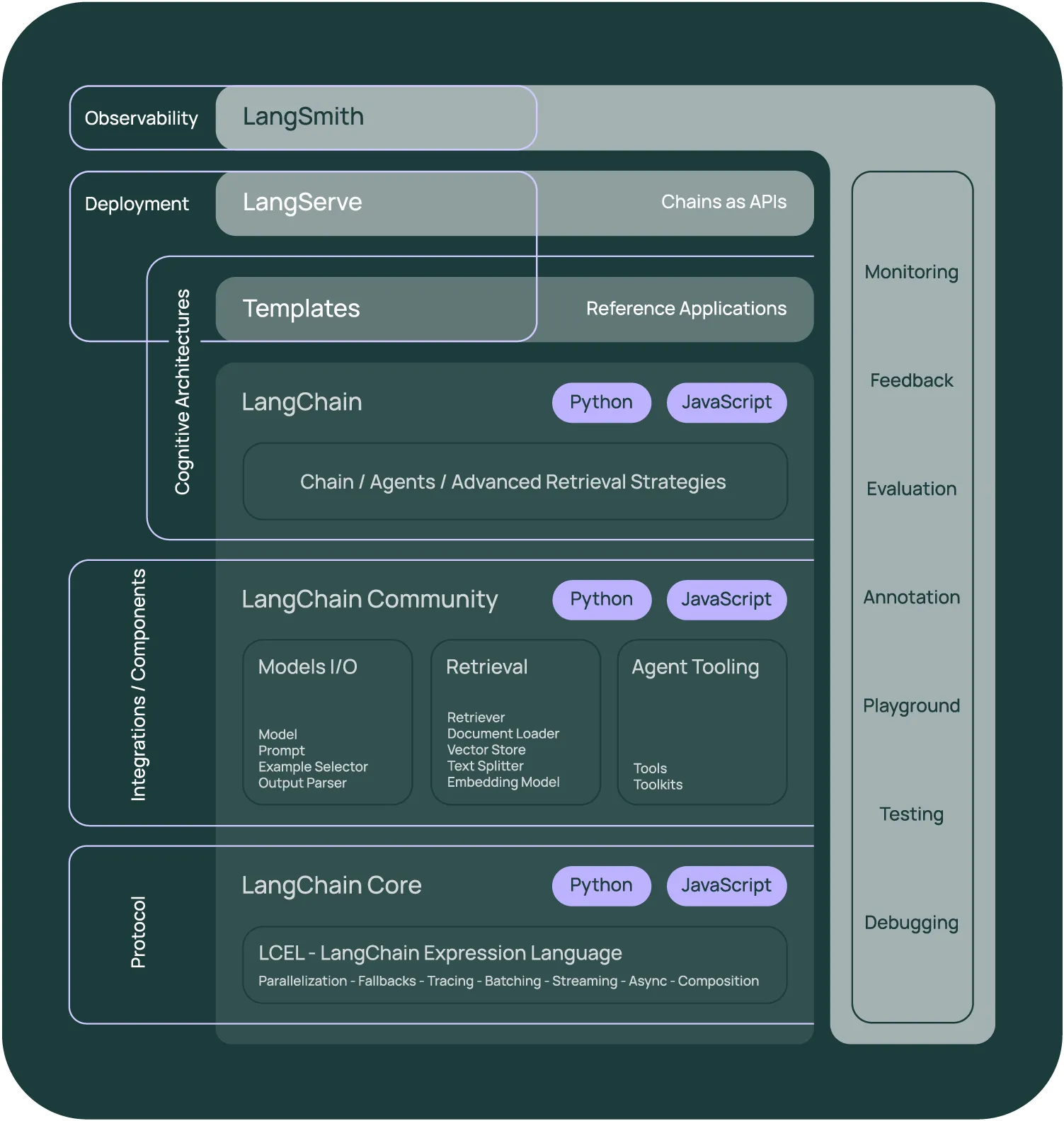What are the differences and functionalities of LangSmith, LangServe, Templates, LangChain, Langchain-Community, and LangChain-Core.
 Sai Prasanna Maharana
Sai Prasanna Maharana
Let's break down each of these tools and components—LangSmith, LangServe, Templates, LangChain, LangChain-Community, and LangChain-Core—to understand their functionalities and differences within the LangChain ecosystem.
1. LangChain
Functionality:
LangChain is an open-source framework designed to simplify the development of applications powered by large language models (LLMs) like OpenAI's GPT-4. It provides a standardized interface for interacting with LLMs and offers tools for building chains (sequences) of prompts and responses. LangChain focuses on:
Chains and Agents: Facilitating the creation of complex workflows that involve multiple LLM calls, decision points, and integrations with external tools.
Prompt Management: Offering utilities for prompt templates, formatting, and dynamic variable insertion.
Integrations: Supporting a variety of LLM providers and data sources, making it easier to switch between models or incorporate multiple models into an application.
Use Cases:
Building chatbots and conversational agents.
Automating workflows that require language understanding and generation.
Developing applications that need to interact with multiple data sources or APIs through natural language.
2. LangChain-Core
Functionality:
LangChain-Core refers to the foundational libraries and modules of the LangChain framework. It includes the essential components required to build and manage chains without additional tooling or extended features.
Key Features:
Core Modules: Provides the basic classes and functions for chains, prompts, memory management, and LLM interfaces.
Lightweight Dependency: Designed to be minimalistic, allowing developers to include only the necessary components in their projects.
Extensibility: Serves as a base for building more complex features or integrating additional tools.
Use Cases:
For developers who need a minimal setup or want to build custom functionalities on top of the core features.
Situations where performance and lightweight dependencies are critical.
3. LangSmith
Functionality:
LangSmith is a developer tool provided by LangChain aimed at building, debugging, and monitoring applications that utilize LLMs and prompt chains. It acts as an observability platform for LLM-powered applications.
Key Features:
Tracing and Logging: Captures detailed traces of chains, including inputs, outputs, and intermediate steps.
Evaluation Metrics: Allows developers to assess the performance of their prompts and models using custom or predefined metrics.
Debugging Tools: Offers insights into where and why a chain may not be performing as expected.
Versioning and Experimentation: Enables comparison between different versions of chains or prompts to optimize results.
Use Cases:
Debugging complex chains where multiple LLM calls and conditional logic are involved.
Monitoring application performance in a production environment.
A/B testing different prompts or models to improve output quality.
4. LangServe
Functionality:
LangServe is a deployment tool associated with LangChain that allows developers to serve their chains as web services or APIs. It simplifies the process of turning a LangChain application into a scalable, production-ready service.
Key Features:
API Generation: Automatically generates RESTful APIs from LangChain applications.
Scalable Deployment: Supports deployment on various platforms, including cloud services and container orchestration systems.
Authentication and Security: Provides features to secure the deployed services, such as API keys or OAuth integration.
Monitoring and Logging: Includes basic monitoring tools to track the usage and performance of the deployed services.
Use Cases:
Deploying chatbots or language processing services that can be accessed over the web.
Integrating LangChain applications with other services or frontend applications.
Scaling up prototypes to handle production workloads.
5. Templates
Functionality:
In the context of LangChain, Templates refer to prompt templates that help in structuring the inputs fed to LLMs. They allow for dynamic content insertion and reusability across different parts of an application.
Key Features:
Dynamic Variables: Use placeholders within prompts that can be replaced with runtime data.
Reusable Components: Create standard prompt formats that can be applied in multiple chains or scenarios.
Parameterization: Adjust prompts easily without hardcoding changes, facilitating experimentation and optimization.
Use Cases:
Standardizing prompts for similar tasks, such as summarization or translation.
Personalizing prompts based on user input or context.
Rapidly iterating on prompt designs to improve model outputs.
6. LangChain-Community
Functionality:
LangChain-Community represents the collaborative and open-source aspects of the LangChain ecosystem. It includes community contributions, shared resources, discussions, and support channels.
Key Features:
Community Contributions: Plugins, integrations, and extensions developed by the community.
Educational Resources: Tutorials, examples, and documentation created and maintained by users.
Support Forums: Platforms like GitHub, Discord, or forums where developers can ask questions, report issues, and share insights.
Collaborative Projects: Opportunities to contribute to the LangChain codebase or related projects.
Use Cases:
Learning best practices and advanced techniques from other developers.
Contributing to the ecosystem by sharing your own tools or enhancements.
Collaborating on projects that push the capabilities of LLMs and chains.
Summary of Differences and Functionalities
LangChain: The main framework for building applications with LLMs, providing tools for chaining prompts and managing interactions with language models.
LangChain-Core: The essential, minimal components of LangChain for building chains, without additional tooling.
LangSmith: A developer tool for debugging, monitoring, and optimizing LangChain applications, focusing on observability and performance evaluation.
LangServe: A deployment utility that turns LangChain applications into scalable web services or APIs.
Templates: Prompt templates within LangChain that facilitate dynamic and reusable prompt construction.
LangChain-Community: The collective contributions, resources, and collaboration efforts of the LangChain user and developer community.
Subscribe to my newsletter
Read articles from Sai Prasanna Maharana directly inside your inbox. Subscribe to the newsletter, and don't miss out.
Written by
